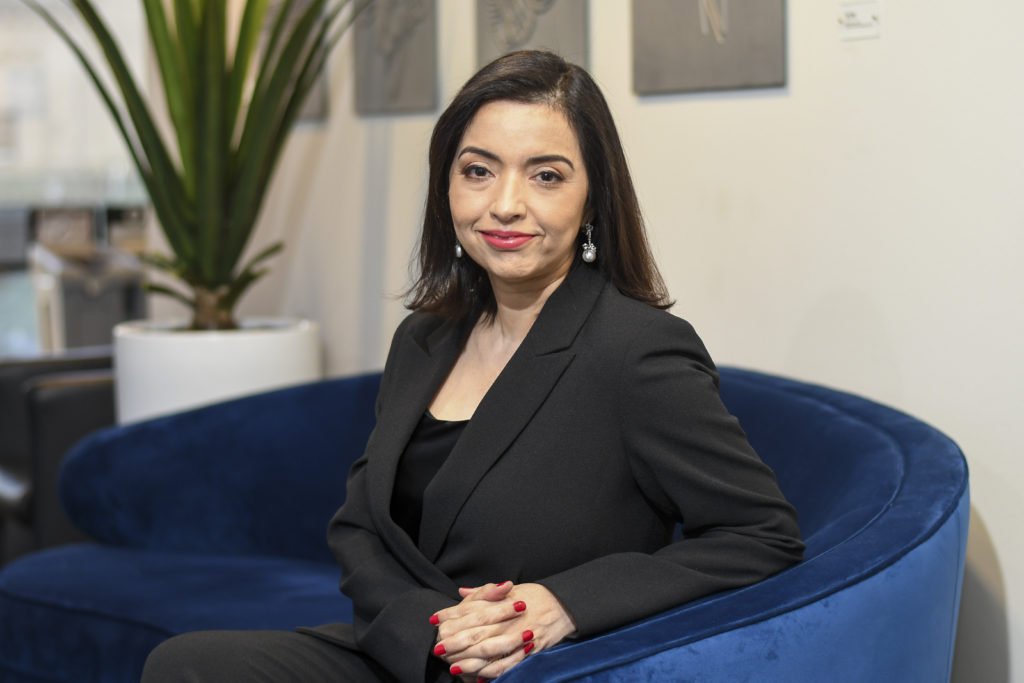
The Gateway International Bridge – a.k.a. “The New Bridge” – rises about 30 feet above the waters of the Rio Grande on the road connecting Matamoros, Mexico, and Brownsville, Texas. Starting as a kindergartener, Belinda Boling crossed the bridge every morning and afternoon on her way to school and back.
“U.S. citizen,” she would say loudly, per her father’s instructions, as she crossed the border.
“I was raised in a Mexican town where it was safe for me to go walking to my grandmother’s house every Saturday to make flour tortillas,” says Boling, whose father was a lawyer in Mexico.
Much has changed during the past three decades.
Boling is now an assistant vice president and senior counsel at AT&T in Dallas. She recently served as the lead attorney for the launch of the over-the-top streaming service, DIRECTV GO, in Latin America. She was part of the initial team integrating recently-acquired wireless companies in Mexico, and she spearheaded the design and implementation of the data protection and privacy program.
She’s also the co-chair of AT&T’s national pro bono committee, which provides guidance and encouragement to the 920 or so in-house lawyers in the telecom giant’s corporate legal department, who perform thousands of pro bono hours annually.
“It was normal for me to see young children selling Chiclets gum on the streets of Matamoros while we waited in line to cross the international bridge.”
Boling is a pro bono ball of fire. She has handled multiple asylum cases, including a heartbreaking representation of a teenaged girl whose mother’s murdered body was found by the FBI. She recruited more than a dozen other lawyers at AT&T to help asylum-seekers with their applications. She expanded AT&T’s pro bono program to its Latin America offices and joined forces with the law firm Akin Gump in a specifically-tailored program that has helped about 2,000 U.S. military veterans get legal assistance.
“Doing pro bono work has been embedded in my DNA since I started practicing law,” she says. “I believe I am obligated to use my law degree to serve the most vulnerable populations.”
Sadly, Boling has also seen her hometown undergo changes since her childhood.
Matamoros is now on the U.S. State Department’s “Do Not Travel” list, carrying the same assessed danger level as Syria and Iraq, due to drug cartel activity and violent crime. Only a couple blocks from the bridge are scores and scores of make-shift tents that have become the temporary homes of thousands of refugees seeking asylum in the U.S.
“Life in Matamoros has changed dramatically,” she says. “It is heartbreaking. It’s dangerous. It is bad.”
Boling physically delivers diapers, blankets and other living necessities to asylum-seekers at the Texas border.
Citing her extraordinary commitment to legal services for the poor, the Association of Corporate Counsel’s DFW Chapter and The Texas Lawbook are pleased to announce that Boling is a finalist for the 2019 DFW Corporate Counsel’s Pro Bono/Public Service Award.
The 2019 DFW Outstanding Corporate Counsel Awards finalists will be honored – and the winners announced – Jan. 30 at a ceremony at the George W. Bush Institute.
“Belinda is an exemplary pro bono leader who has enriched AT&T’s culture of pro bono and constantly strives to meet the legal needs of low-income individuals in her community,” says Clarissa Benavides, who is corporate counsel for data privacy and regulatory matters at Irving-based Flowserve.
“Belinda’s advocacy makes a real difference to her pro bono clients, and her outreach and organizational efforts encourage her colleagues to make a difference,” says Benavides, who nominated Boling for the award.
Boling was born in Brownsville. Her father was a lawyer in Matamoros who practiced mainly civil litigation.
“Because he did not speak any English, he was unable to expand his client base to include English-speaking clients,” she says. “Yet, he worked hard and made a tremendous sacrifice to make sure that my three siblings and I received a good education. He was proud that we had dual citizenship.”
Her mother, who did not complete her high school education, stayed at home to raise the children.
For a dozen years, Boling crossed the New Bridge for school. She had friends on both sides of the border. She shopped at stores on the Texas side.

“I had the privilege of growing up with two vastly different cultures,” she says. “I crossed the border every day to go to school from kindergarten through high school in Brownsville. It was normal for me to see young children selling Chiclets gum on the streets of Matamoros while we waited in line to cross the international bridge and would then be exposed to the conveniences of a U.S. town filled with department stores and chain restaurants.”
Boling received her master of business administration degree from the Red McCombs School of Business at the University of Texas in 1994.
After a few years of work in accounting and finance positions in Brownsville, she heard about ProBAR, which is the ABA’s South Texas Pro Bono Asylum Representation Project, and was fascinated. She took a job at ProBAR as a paralegal.
“I crossed the border every day to work at ProBAR’s offices in Harlingen,” she says. “I gave rights presentations to detained immigrants at the remote Port Isabel Service Processing Center and met attorneys who traveled to South Texas to represent asylum-seekers on a pro bono basis.”
That’s when Boling decided to become a lawyer. She enrolled at St. Mary’s University School of Law, where she graduated cum laude in 2002.
Strasburger & Price hired Boling that year to practice business and commercial litigation and some personal injury defense work.
Then she “jumped on the opportunity” to work in AT&T’s legal department in 2007.
“One of the largest advantages of working in the AT&T legal department is the opportunity to rotate roles,” she says. “During my 12-year career at AT&T, I’ve held eight different roles.”
At first, she was the legal support for the company’s supply chain organization. Then she was the lawyer for the cloud and wholesale service, AT&T AdWorks, corporate real estate and the Big Data Center of Excellence.
Boling currently leads a team of attorneys responsible for providing support to Vrio, the leading provider of digital entertainment services in South America, in the areas of compliance, cybersecurity, IT, supply chain, antipiracy, ad sales, human resources, broadcast operations, finance and tax.
“Most recently, I was part of the initial team sent to Mexico to integrate the third- and fourth-largest Mexican wireless companies following AT&T’s acquisition of both companies,” she says. “Both had different cultures and, up until the mergers, both were fierce competitors in the Mexico wireless market.
“As part of my role, I oversaw the implementation of consistent, robust compliance and privacy programs in line with AT&T’s global programs,” she says. “In some cases, this involved creating the programs from scratch, while in other cases I had to modify and update what each of those two entities had in place.”
Boling says her friend and AT&T colleague Pamela St. John approached her about doing pro bono work shortly after the inception of the formal pro bono program in 2009. Boling now serves as the national co-chair of the legal department’s pro bono committee.
A key reason for the success of AT&T’s pro bono efforts, she says, is that they “have top-down support for bottom-up programs.”
“We have investment from the top – from General Counsel David McAtee and his management team,” she says. “That support is both organizational and personal.”
“From a personal perspective, it helps considerably to co-manage pro bono programs when you have direct support from senior leadership,” she says. “However, the support from the senior level doesn’t stop with organizational matters. The officers and senior managers actually participate in pro bono cases and have a history of doing so throughout their careers.”
Bottoms-up programs, according to Boling, mean that the pro bono activities of AT&T lawyers are chosen by the lawyers themselves. Legal department leaders do not designate or mandate specific pro bono programs.
Pro bono programs are mostly local-based and rely on individual lawyer initiative and volunteerism.
As a result, Chicago-based AT&T attorneys work with Equip for Equality, a federally-designated entity in Illinois responsible for providing educational information and assistance to persons seeking disability-based benefits. The program came about after an AT&T lawyer, who is the parent of a child with disabilities, approached his colleagues to staff the EFE help line.
Similarly, 13 Dallas-based AT&T attorneys partnered with the Refugee and Immigrant Center for Education and Legal Services (RAICES) to help eight pro se asylum-seekers share their stories of persecution and fear on their asylum applications. In addition, 26 members of the Hispanic Association of Communications Employees of AT&T (HACEMOS) volunteered to interpret and translate crucial documents.
Boling, for example, helped a 17-year-old high school student from Mexico with her Deferred Action for Childhood Arrivals application.
During the interview, the student shared that her mother was missing for six months.

“I was aghast and did not want my assistance to this young girl to end at the clinic,” she says. “After the clinic, I helped her with the submission of the DACA application, which was approved. On her 18th birthday, what should have been a happy day, the FBI informed the student that they’d found the murdered body of her mother.
“Everything stopped. It wasn’t about legal status anymore,” she says. “It was about comforting a child who just lost her mother. Because her mother’s case went from a missing person case to a murder, she was eligible to apply for a U visa, which is for victims of violent crimes who assist with the investigation.”
With the help of the Human Rights Initiative of North Texas, the student’s U visa was approved.
“I am passionate about helping asylum-seekers, especially those who remain in Mexico due to the Migration Protection Protocols,” she says.
Boling is also assisting two pro se asylum-seekers from Cuba, who are stuck in Matamoros, with their asylum applications.
“It has been a challenge to complete their asylum applications through WhatsApp and without meeting face-to-face,” she says. “Despite these challenges, I completed their applications and obtained corroborating evidence in support of their applications. It has been a family affair. My mother, who resides in Matamoros, has helped deliver the documents to the Cubans.”
Boling’s role in initiating AT&T’s legal department to the ABA’s National Celebration of Pro Bono starting in 2016 has proven fruitful. Last year, about 100 AT&T attorneys participated in more than 50 different pro bono activities and logged about 400 pro bono hours.
“Belinda has extraordinary dedication to her clients, whether they are executives seeking savvy advice or immigrants seeking critical protection,” says Akin Gump partner Steve Schulman. “Largely through her efforts, AT&T has made a significant commitment to pro bono service by motivating its lawyers, by encouraging lawyers at the law firms it hires, and by sponsoring Equal Justice Works fellows at legal services organizations. Belinda leads by example; she has provided many hours of pro bono representation.”
AT&T’s pro bono efforts also have focused on veterans with legal needs. Boling and her national pro bono co-chair joined forces with Akin Gump to sponsor an Equal Justice Works Fellow to lead the Veterans Consortium’s Discharge Upgrade Program. During the past two years, the Discharge Upgrade Program has served more than 2,000 veterans and provided representation to more than 110 veterans.
Boling says that pro bono work is an excellent way for law firms to get to know AT&T lawyers better.
“We need to come together to encourage attorneys to do pro bono work,” she says. “Just as we solve the most complex challenges for our clients, corporate legal departments and law firms need to form unique pro bono collaborations to more efficiently handle pro bono work.”
